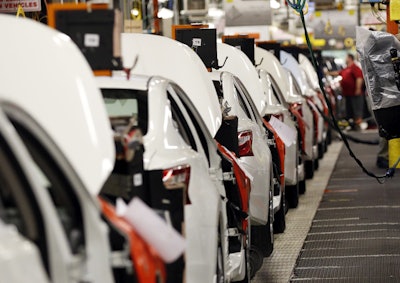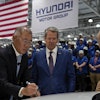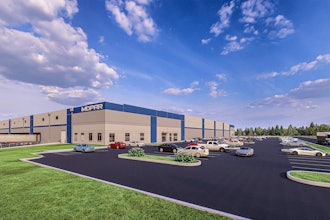
On this day in 2002, California Gov. Gray Davis signed legislation for strict automotive emissions despite considerable resistance from the auto industry and the United Auto Workers. Assembly Bill 1493 was the first law in the U.S. to address greenhouse gas emissions from vehicle exhaust.
California represents 10 percent of the U.S. automobile market and is well known for struggling with air pollution. The state was one of the first to enact legislation for fuel emissions that was more strict than the federal standards. AB 1493 required automakers to reduce the greenhouse gas emissions from their vehicles by 22 percent by 2012 and reduce them by 30 percent reaching 2016.
 In this April 6, 2016, photo, an assembly line of new 2016 Altimas await backseat installations at the Nissan Canton Vehicle Assembly Plant in Canton, Miss. On Friday, July 15, 2016, the Federal Reserve reports on U.S. industrial production for June. (AP Photo/Rogelio V. Solis)
In this April 6, 2016, photo, an assembly line of new 2016 Altimas await backseat installations at the Nissan Canton Vehicle Assembly Plant in Canton, Miss. On Friday, July 15, 2016, the Federal Reserve reports on U.S. industrial production for June. (AP Photo/Rogelio V. Solis)Congress first passed national fuel economy standards in 1975 as a response to the 1973 oil embargo. Known as the Corporate Average Fuel Economy (CAFE) standards, they were aimed at reducing greenhouse-gas emissions from cars and trucks in order to combat global warming.
To no surprise, the auto industry has a history of opposing the increasing restriction of these standards due to the hassle of changing production and potentially increasing costs.






















